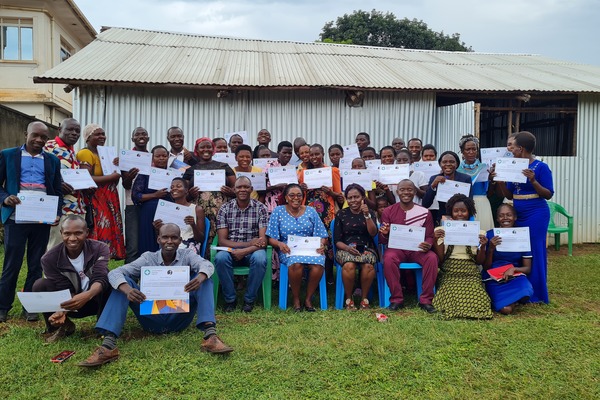
"Highly understandable"
"Great solution to fighting poverty and hunger"
"Thank you for the knowledge you gave us"
From a talk on the recent trip with the attached slides
Poverty is not part of God’s plan. God gives the Israelites detailed economic programmes – the Jubilee principles – and says in Deut 15: “There will be no poor among you, for in the land the LORD your God is giving you to possess as your inheritance, he will richly bless you if only you fully obey the LORD your God and are careful to follow all these commands I am giving you today.” But these principles, of tithing, letting the land rest, debt cancellation, freeing slaves, return of land, were never fully followed. It was not until Acts 4 and the coming of the Holy Spirit at Pentecost that we were able for a time to eliminate poverty from the nation of believers: “With great power the apostles continued to testify to the resurrection of the Lord Jesus, and much grace was upon them all. There were no poor among them”.
What does poverty mean?
In rural Uganda I saw three small children collecting firewood (see below). It’s a weekday morning. These kids are not in school. They’re collecting firewood. The two girls don’t have shoes and it’s a rough track. Poverty means work not school.
I was there, in the beautiful Lake Bunyonyi area, at the invitation of Alice. Alice was 8 years old when the soldiers came. Normally, she and her mum and two younger sisters slept in the woods at night but that evening her uncle came and they had lingered. Idi Amin’s soldiers had guns and spoke a language she did not understand. Her Mum and Uncle were pulled outside. Her mum was abused and robbed. She never saw her Uncle again. Poverty means powerlessness.
The next morning, her Mum said it was too dangerous to live there in the town of Kabale, where her mum worked. So they walked for 8 hours, barefoot, to a tiny community by Lake Bunyonyi, where the family were from. She and her sisters were left with her grandmother. This is her late grandmother’s house. Poverty can mean separation from parents.
Alice’s single mother Florence couldn’t read or write. But Florence was determined her daughters would get a better life. When they were able to return to Kabale, she chose to give them one meal a day so she could pay the school fees. Poverty means hunger.
Alice walked barefoot to school and worked hard despite her hunger. She won a scholarship but she didn’t take it up because there was no money for school uniform. Instead, she set up a business selling bananas. Amongst her customers was a missionary couple who offered to sponsor her through school. It was the beginning of a journey that eventually took her to London where she trained as an accountant and in time set up a charity to support her home community. Here’s the clinic her charity has just opened, dedicated to her mum.
The good news is that in my lifetime, extreme poverty has fallen from over 50% to around 10% of the global population. Most of the change has come in Asia, not through charity but through enterprise.
The bad news is that this 10% hasn’t fallen for a decade. Its still very difficult for single mothers in Uganda to put food on the table and pay school fees. Many widows instead send their children to orphanages, where food and education are guaranteed. It’s relatively easy for orphanages to raise money from the West. Who would not want to support desperate kids?
TEN takes a different approach. We want to help widows and others to set up a simple business that enables them to feed and educate their children. We want to keep families together; give dignity not charity; and avoid dependence.
Alice was the first of five hosts on my recent visit to Uganda.
There are two main things TEN does. The first is to help people start small business to generate an income. The principle is based on the feeding of the 5,000: start with the little you have. What are the loaves and fishes you have that God can multiply? I ran five training programmes over the two weeks. The first was a classroom in Kabale; the next required taking a boat and the training was outside. They received their certificates and were very happy when it was over!
Next day, I caught the 4am Matatu for the 8 hour journey to the capital Kabale. These are minibuses licenced for up to 14 passengers but often carry 19 adults plus kids plus chickens. Once in Kampala, I got on a Boda-boda bike to get to the compound for Chloe and Sam Mutton. I’m used to this in rural areas but you have to keep your wits about you on the manic streets of Kampala. As we weaved through the traffic, if I hadn’t noticed the truck wing mirror and ducked I might well have been thrown off.
I arrived in time for a community barbeque Chloe organised, her garden was packed with people. Chloe runs a women's’ empowerment initiative so I trained them and encouraged them by saying that – according to Forbes – women are more successful entrepreneurs than men. Why? Forbes reckoned it was because men can be over confident, but women were typically more humble, and willing to listen to others.
I travelled the 6 hours to Mbale and at this halfway point did something new: I took a day off hiking the nearby Sipi Falls.
Next training was in a corrugated iron church. Many were pastors. One was a missionary heading for war-torn Sudan. Inevitably there was time to worship and 17 signed up to deliver the training to others. They are now connected through a WhatsApp group.
I said there were two main things TEN does. One is business start-up training; The other is to partner with local entrepreneurs to create businesses able to employ others or generate an income to support a social enterprise. Some of you know I co-own a business near Bethlehem, set up with a Palestinian Christian partner to create jobs and hope.
There are two businesses we have set up in Eastern Uganda, both are models we want to replicate.
The first are these beautiful guest houses next to the 7,000 year old Nyero rock paintings. I think there are many tourist who want to meet local people and have an authentic Africa experience, albeit with Western standards of bathroom facilities. There is a shower and proper sit down loo behind the wall at the back. They are in a beautiful area and hosts James and Elizabeth will make delicious food, guide you on hikes and provide transport. Students at their Alternative Technology Training Centre helped construct the guest houses and make the furniture. Profits go towards this centre to make it sustainable.
(More information on the guest houses and to book click here)
The second is fish farm, also with a view to replication and to generate funds for vocations training. The development is at TANU, founded by Joel, with his wife Sharon. TANU how has something of a campus. Student numbers have doubled since TEN got involved and helped build the skills centre (on the right) and Women’s hostel (with a red roof). Joel was one of 20 young people across Uganda recently selected to meet the President. Once again, I provided training over two days for the students in an outdoor teaching area.
Incidentally, some may remember the old church and school with the leaky roof. As a bit of a side line, we have enabled the replacement to be completed.
After the training, we celebrated with marshmallows (which they hadn’t experienced) and spontaneous worship.
Thank you for your prayers: there were some amazing answers: sitting next to the one person on the packed 8 hour bus from Soroti who knew exactly where I should get off to get the Entebbe Express; meeting the MP for Soroti on the plane home and swapping cards. Staying safe and healthy.
So that’s what TEN does. We are a community of Christian business people committed to finding enterprise solutions to poverty. We also organise retreats and set up a conference in London in June to inspire and spread the word. We’re all volunteers so most of what we receive, from this church and several individuals here, go towards grants to facilitate the development of social enterprise.

These children should have been at school but were collecting firewood





